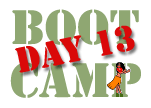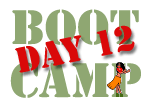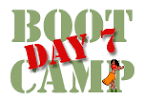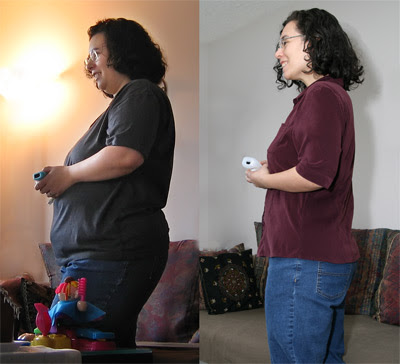
So yesterday I finally bought
You on a Diet and spent all evening on the couch, in the bedroom, and yes, even in the washroom reading it. It's a very interesting and enlightening book and I'm wondering why I didn't buy it sooner. In a nutshell, it tells you in simple terms the science of hunger and digestion and what goes wrong when you fill your body with crap.
The book is written in a very accessible style. It uses funny metaphors instead of jargon to explain how the body works. I can see how some people might be put off by this style, but I prefer it to techno-babble. I laughed more than a few times!
The only thing so far that I don't like about it is their occasional referrals to you, as the reader. It's hard to explain it, but it's almost a little rude and condescending. I think they were just trying to be funny in a "we're laughing
with you, not
at you" sort of way. Fortunately, it doesn't happen too often and the rest of the info is more than worth it.
I'm not even a quarter of the way through the book and there were so many lightbulb moments that I've lost track. The biggest thing (no pun intended) I learned is why many health professionals are saying that we should be more concerned with our waist size than our BMI. Part of it has to do with this thing called an omentum that we all have.
Omentum is belly fat and it literally hangs off our stomachs. The bigger it is, the more dangerous to your health it is and the more problems it causes. Take it from me, after seeing their diagram in the book, I'm completely grossed out by the thought of how big my omentum was and how it's
still too big.
If you want to know what a normal omentum looks like compared to a big omentum, try the following link (
WARNING: GROSS, GRAPHIC, AND TMI, don't say I didn't warn you),
courtesy of Oprah. If that isn't an incentive to
not to fill your body with crap, I don't know what is. Yuck, yuck, and more yuck.
There's much more to the book than our omentums though. It also talks about inflammation due to poor eating, how our small intestines are like a second brain, the work our poor liver has to go through, and much much more. Presumably the book will also go into what we can do to retrain our eating habits, what to eat, how to exercise and so on. I haven't gotten there yet, so I'm only going by the table of contents.
There's also a diet plan in the back of the book. When I get to that section, I'll see how it meshes with Weight Watchers. I'm hoping it'll give me a better idea of nutrition. I think I'm doing pretty okay with it so far, but I know I can do better. Fortunately, any cravings I've had for 100-calorie packs are entirely squooshed...for now ;)
So far, two thumbs up. I'd give it 4 out of 5 stars if I were reviewing it on Amazon.
 There was no Bootcamp for me tonight. Instead, like the last minuter that I am, I bought an RRSP. For those visiting from beyond Canada, there's a flurry of RSP buying that happens in February. We do it so we don't have to give the government anymore income tax than is absolutely necessary.
There was no Bootcamp for me tonight. Instead, like the last minuter that I am, I bought an RRSP. For those visiting from beyond Canada, there's a flurry of RSP buying that happens in February. We do it so we don't have to give the government anymore income tax than is absolutely necessary.
 I'm afraid this one will be a little short because I'm writing it a few weeks after the fact and my memory is a little fuzzy!
I'm afraid this one will be a little short because I'm writing it a few weeks after the fact and my memory is a little fuzzy!




 I was on my own tonight as Mr. Trim was still recovering from having all four wisdom teeth out. I didn't really want to go as work had been so stressful, but I knew I needed to. I was half hoping we'd do another round of ball kicking like on Tuesday so I could work out some frustration, hehe.
I was on my own tonight as Mr. Trim was still recovering from having all four wisdom teeth out. I didn't really want to go as work had been so stressful, but I knew I needed to. I was half hoping we'd do another round of ball kicking like on Tuesday so I could work out some frustration, hehe. We started the night with a warm-up as usual, but the game was different. We had to do whatever the instructor said (don't we always?) kinda like Simon Says, but really fast. Run in one spot really fast, run sideways really fast, turn around in a circle really fast, turn the other way really fast, and so on. It was a lot of fun, but really dizzy, too!
We started the night with a warm-up as usual, but the game was different. We had to do whatever the instructor said (don't we always?) kinda like Simon Says, but really fast. Run in one spot really fast, run sideways really fast, turn around in a circle really fast, turn the other way really fast, and so on. It was a lot of fun, but really dizzy, too!

 Call me a hopeless romantic but I just couldn't find it within myself to make the husband and I go to Bootcamp this evening. After looking into the tired eyes of the man who got up at 5 a.m. to make me
Call me a hopeless romantic but I just couldn't find it within myself to make the husband and I go to Bootcamp this evening. After looking into the tired eyes of the man who got up at 5 a.m. to make me 


 Tonight's Bootcamp was all about balls. Exercise balls! We warmed up with the ball, we ran with the ball, we dribbled with the ball, we did crunches with the ball, we did squats with the ball, we did resistance training with the ball, we tossed the ball, we sat on the ball, we fell off the ball (okay, that was just me), we even did yoga with the ball. It was Night of the Living Ball.
Tonight's Bootcamp was all about balls. Exercise balls! We warmed up with the ball, we ran with the ball, we dribbled with the ball, we did crunches with the ball, we did squats with the ball, we did resistance training with the ball, we tossed the ball, we sat on the ball, we fell off the ball (okay, that was just me), we even did yoga with the ball. It was Night of the Living Ball.


 We were indoors for some of Bootcamp last night, but spent most of it on a little field trip. Our instructor had us run up to a local rec centre then do a bunch of exercises there with resistance bands. There's nothing like working out around a busy rec centre with parents and kids coming and going and gawking at you, hehe.
We were indoors for some of Bootcamp last night, but spent most of it on a little field trip. Our instructor had us run up to a local rec centre then do a bunch of exercises there with resistance bands. There's nothing like working out around a busy rec centre with parents and kids coming and going and gawking at you, hehe.

 There was a real humdinger of a wet and wild West Coast storm moving in last night, so our instructor decided to be "nice" to us by letting us work inside the gym. Little did I know what she had in store for us – circuit training. *cue blood-curdling scream*
There was a real humdinger of a wet and wild West Coast storm moving in last night, so our instructor decided to be "nice" to us by letting us work inside the gym. Little did I know what she had in store for us – circuit training. *cue blood-curdling scream*







